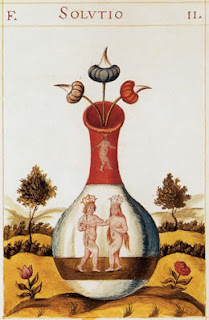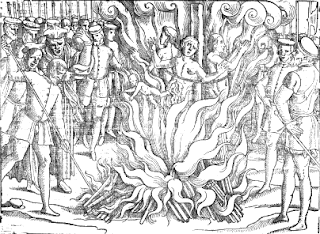
Sexism is insidious.
The Latin etymology is fascinating, meaning something like, "sitting there and waiting to ambush." It has a hidden treacherous quality. The lurking lion. Unknown to us. Behind the bushes. Quiet until it strikes with great force and surprise.
Why is sexism insidious? Because it is part of who we are as products of this society. It is built into the structures around us. It is our past and it haunts our present. None of us, no matter how well-intentioned we are, can completely escape it, although try we must!
Imagine my horror and guilt when I realized last week that my own blog roll sorely lacked women bloggers, that I, someone who is a vocal advocate for women's equality, was contributing to the problem of their silence in the biblioblog field! Yes, I had listed those few I knew, but I had not made a concerted effort to go out and find more. I had not networked with others in my field that might know their whereabouts. Thus my recent posts on gender included my own promise that I would try to build a blog roll that reflected what was actually happening in terms of women bloggers and the bible, whatever that turned out to be. Over the weekend, I found that indeed women's voices are out there, but they are largely unengaged, marginalized, hidden from us, or run out of the discussions. This makes it look like they aren't there or aren't interested.
So as for blame, well, who will cast the first stone? Not I. I am one of the crowd convicted by Jesus' words.
My response to the problem of the silence of women on the biblioblogs is not to fix blame, or spend a lot of time succumbing to guilt, but to analyze the problem and then immediately mobilize, to ask what needs to be done to correct it and go about doing so the best I can. So although I think that we are all part of the problem given the insidious nature of sexism, we can also all be part of the answer. We can make the choice to mobilize and make this the year that women bibliobloggers are brought into our community as welcomed and engaged voices.
What are some practical things we might do? These are only a few suggestions that occur to me based on what I have learned from other women bloggers this week and from my own experience as a woman in the blog world. I hope you will send along your own ideas so I can add to these.
The important part is to implement, whether that implementation appears to others as a "token" or not. Even something that is perceived by others as a "token" is a small step in the right direction that will help raise awareness. If we do nothing but continue to sit around our computers and complain, be bitter, criticize those who are trying to do something positive, or feel sorry for ourselves, nothing is going to change. The choice is ours.
1. Link to women bloggers on our blogs, through blog rolls and/or occasional posts that highlight a discussion going on among women bibliobloggers and religion bloggers. Engage
positively with women who are blogging. Find some common ground between the two of you and blog on that. If in question, you might check out some male blogs whose authors have had positive engagements with women bloggers in their posts. I am reticent to name names in case I leave someone out inadvertently and give offense. I think it is very evident who those bloggers are.
2. Go out and support a woman in our field, help her get started with a blog of her own.
3. Follow the links on women's websites and blog rolls and find new blogs that none of us know are there. Let the rest of us know.
4. Invite a woman scholar, minister, or graduate student to write a guest post for your blog, especially if she is not already blogging. You might even do so once a month.
5. Include book notes and article notes on publications that women are making in our field.
6. Give bloggers the benefit of the doubt and don't jump to a negative conclusion immediately or sensationalize or trivialize their position. I think this must be the ideal we strive for, even if we might fail sometimes. We ought to read what they have said and allow it our best interpretation, not our worst. If in doubt, we ought to ask the blogger what he or she meant before drawing a negative conclusion. Ask for further clarification. Most of us are not trying to be jackasses.
7. Ultimately we need to recreate the biblioblog climate. My thoughts on this is that this network should not operate as a men's club. Nor should it reflect the conversation that might be going on in the men's bathroom. It should not be a male competition, an academic meeting, or a war. It is a very public and very international forum that invites us to speak together as a world community. We need to allow for the fact that different people with different backgrounds blog for all kinds of different reasons. If we want women to blog on the bible, and we want them to be counted among us, then their posts and their persons need to be treated civilly and respectfully. If in doubt, ask yourself if something you are posting about a woman or her words is something you would want said about your wife or your mom or your daughter.
I leave this post with a prayer whose words came rushing into my mind this morning while I was walking to my office. From St. Francis:
- Lord, make me an instrument of your peace;
- where there is hatred, let me sow love;
- where there is injury, pardon;
- where there is doubt, faith;
- where there is despair, hope;
- where there is darkness, light;
- and where there is sadness, joy.


















































































